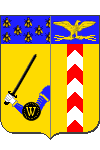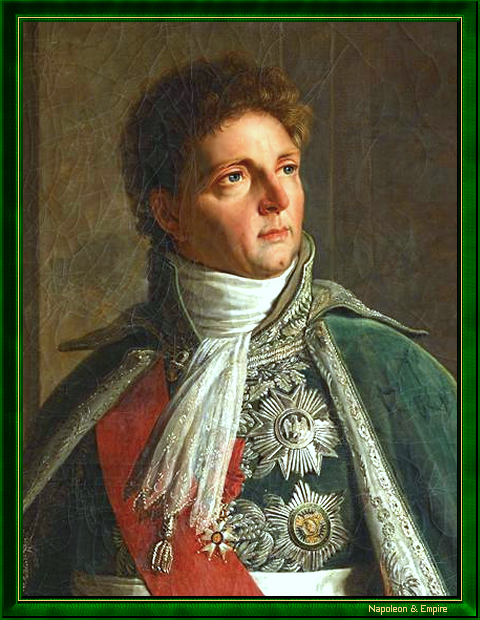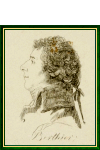Prince of Neuchâtel and Wagram
Pronunciation:

Louis-Alexandre (known as Alexandre) Berthier was born in Versailles on November 20, 1753, to Jean-Baptiste Berthier, a geographer and engineer ennobled by Louis XV, and Marie-Françoise l'Huillier de la Serre, chambermaid to Monsieur (the Count of Provence, the future King Louis XVIII).
After studying at the Mézières engineering school and graduating as an engineer-geographer, Berthier took part in the American War of Independence, under the command of Jean-Baptiste Donatien de Vimeur de Rochambeau.
In 1789, he became major-general of the Versailles National Guard.
Chief of staff to Gilbert du Motier de La Fayette (whom he had met in the United States) and then to Nicolas Luckner, suspected of royalism, he was dismissed after August 10, 1792, but returned to service the following year in the Army of the West as a volunteer. Armand Louis de Gontaut-Biron made him his chief of staff. In 1795, he was reinstated in his rank and became chief of staff of the army of the Alps and Italy.
Appointed division general in June 1795, he became a friend of Napoleon Bonaparte and then, as usual, chief of staff, this time for the army of Italy. On February 15, 1798, he commanded the French army as it entered Rome .
A skilled and experienced soldier (he was wounded at Lodi, and had a horse killed beneath him at Wagram), Minister of War on two occasions, from November 1799 (the day after the 18 Brumaire) to April 1800, then from October 1800 to August 1807, he was showered with honors by Napoleon I: Marshal in 1804, Prince of Neuchâtel and Vallengin in 1806, Vice-Constable of France in 1807, Prince of Wagram in 1809.
Throughout these years of campaigning, Napoleon I greatly appreciated his unique qualities as organizer and executor, coupled with an impressive capacity for hard work. Berthier's ability to grasp imperial thoughts, often expressed briefly or imprecisely, sometimes interspersed with swear words; to transcribe them into precise, intelligible orders; to organize in detail the role of each officer within the general staff; to be able to respond to imperial requests at any time of the day or night, and to give the Emperor the information he wanted; to be his confidant, and occasionally his whipping boy: these were the qualities that made Berthier indispensable to Napoleon, and that he sorely lacked during the Belgian campaign of the Hundred Days.
In 1814, at the age of sixty, Berthier, longing for peace and rest, rallied to Louis XVIII, who made him Peer de France; then, in 1815, he accompanied him on his flight.
Taking refuge in his castle [Neue Residenz] in Bamberg, Upper Franconia, Bavaria (now Germany), near his father-in-law, Louis-Alexandre Berthier died on June 1, 1815, falling from a third-floor window: suicide due to a state of depression, an attempt to prevent him from rallying to the Emperor, a crime or an accident?
He is buried in the Wittelsbach family vault in the parish church of Tegernsee, Germany.
"Louis Alexandre Berthier, Prince of Neuchâtel and Wagram" by Jacques Augustin Pajou (Paris 1766 - Paris 1828).

Berthier's name is inscribed on the 23rd column (south pillar) of the Arc de Triomphe de l'Étoile.
Freemasonry : Marshal Berthier seems to never had been initiatedDetailed military career
Established by Mr. Eric Le Maître, posted online with his kind permission.Wounds in action
Shot in the arm at Marengo, June 14, 1800.
Spear wound to the head at Brienne, January 29, 1814.
Captivity
NoneFirst engagement
Geographer engineer of the king's camps and armies, January 1, 1766.Career development
Lieutenant, March 24, 1772.
Captain, June 2, 1777.
Major, July 1, 1788.
Lieutenant-colonel, July 11, 1789.
Adjutant-general colonel, April 1, 1791.
Field Marshal, May 22, 1792.
Brigadier General, March 5, 1795.
Major General, June 13, 1795.
Marshal of the Empire, May 19, 1804.
Service record
With the Flanders legion, March 24, 1772.
Attached to the Lorraine dragoon corps, August 16, 1776.
2nd Regiment of Horse Chasseurs, April 8, 1779.
To the Soissonnais infantry regiment, April 26, 1780.
Governor of the hôtels de la Guerre, de la Marine and des affaires étrangères, in succession to his father, October 1, 1780.
Sous aide maréchal général des logis surnuméraire à l'armée de Rochambeau en Amérique, January 1, 1781.
Assistant to the army staff, June 13, 1783.
Assistant field marshal, December 2, 1787.
Employed at the Saint-Omer camp, July 1, 1788.
Aide maréchal général des logis to General Lafayette's troops, December 25, 1789.
Acting commander at Versailles, December 27, 1789.
Employed in the 1st and 16th divisions, April 1, 1791.
Employed in the 17th military division in Paris, June 25, 1791.
To the general management of the War Depot, April 25, 1792.
With the Armée du Nord, May 22, 1792.
La Fayette's chief of staff, May 26, 1792.
Suspended from his duties, September 20, 1792.
Authorized to serve as a volunteer in the Ocean Coast army, May 11, 1793.
Requested by the people's representatives to the Côtes de la Rochelle army to act as chief of staff for this army under Biron, June 12, 1793.
Sent on mission to Paris, July 17, 1793.
Chief of Staff and Brigadier General in the Army of the Alps and Italy, March 5, 1795.
Chief of Staff of the Army of the Alps, October 8, 1795.
Napoleon Bonaparte's Chief of Staff, Army of Italy, March 2, 1796.
Commander-in-Chief of the Army of Italy, December 9, 1797.
Chief of Staff, Army of England, March 8, 1798.
Chief of Staff, Army of the East, May 10, 1798.
Minister of War, November 11, 1799.
General-in-Chief of the Reserve Army, March 2, 1800.
Minister of War, from October 8, 1800 to August 9, 1807.
Senator and Grand Officer of the Palace, July 11, 1804.
Grand Veneur of the Crown, July 11, 1804.
Major General of the Ocean Coast Army, August 3, 1805.
Served with the Grande Armée in Austria, Prussia and Poland, 1805-1807.
Vice-connétable of the Empire, August 9, 1807.
Major-General of the Army of Germany, March 17, 1809.
Major General, Army of Spain, December 1, 1809.
Ambassador Extraordinary to Vienna, February 27, 1810.
Colonel General of the Swiss, June 13, 1810.
President for life of the electoral college of the Po department, January 10, 1812.
Major General of the Grande Armée in Russia, February 1, 1812.
Major General of the Grande Armée under Napoleon I in Germany, then in France, March 14, 1813.
Captain of the 5th Company of the King's Bodyguard, June 1, 1814.
Peer of France during the First Restoration, June 4, 1814.
Followed Louis XVIII to Ghent, then fled to Bavaria, 1815.
Address
57, Rue Saint-Dominique. Paris VIIème arrondissement
At this address is the Hôtel de Monaco, built in 1772, which was under the Empire the property of Marshal Berthier.From 1805, he also owned the Château de Grosbois.
Other portraits

Enlarge
"Louis Alexandre Berthier, Prince of Neuchâtel and Wagram". Miniature by Jean-Baptiste Isabey (Nancy 1767 - Paris 1855) from the famous Table of Austerlitz (a.k.a. Table of the Marshals).

Enlarge
"Portrait of Louis Alexandre Berthier". Engraving by André Dutertre (1753-1842).

Enlarge
"Marshal Berthier". Miniature from the nineteenth century.

Enlarge
"Louis Alexandre Berthier" by Antoine-Jean Gros (1771-1835).

Enlarge
"Louis Alexandre Berthier, Prince of Neuchâtel and Wagram" by Andrea Appiani (Milan 1754 - Milan 1817).